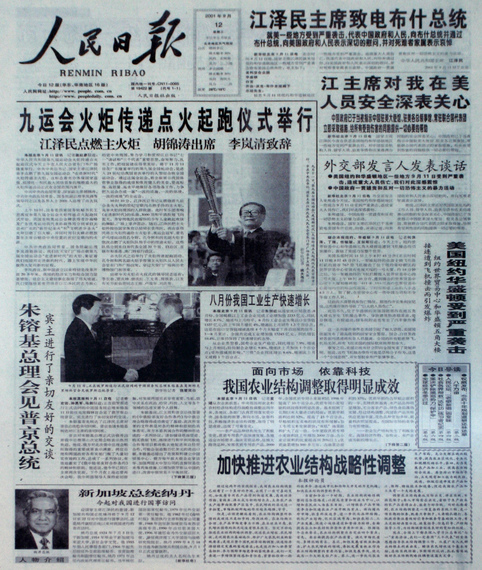By Suzanne Nossel, Executive Director
The Chinese government appears to be putting down its saber in the weeks-long showdown over two dozen American journalists from the New York Times and Bloomberg whose visa renewals were delayed over the last month. What appeared to be a standoff between China and the West is part of a long-term, higher-stakes battle between China and its own increasingly informed and mobilized citizenry. Even if they banish foreign reporters from Beijing, the stories Chinese officialdom most fear will still be told and heard.

China has long retaliated swiftly against those whose ideas and writings it judges subversive. The country's most famous dissidents, including 2010 Nobel Peace Prize winner Liu Xiaobo and artist Ai Wei Wei, are renowned for their piercing critiques of Chinese repression. In recent years, though, China's clamp-down has focused not just on ideologies it sees as menacing, but also on the flow of factual information that it deems equally dangerous. Increasingly, China's leaders are kept up at night not by regional neighbors or the United States, but by worries over homegrown corruption. Rampant corruption threatens economic productivity, sows rifts among elites and feeds anti-government sentiment. Since his appointment last year, Chinese President Xi Jinping has made fighting corruption a signature. Last week it was revealed that he launched a corruption inquiry against former domestic security chief Zhou Yongkang, the highest-ranking Communist official ever to be targeted by such a probe.
Beijing is now targeting those outlets that have worked to unmask its good government makeover. Both Bloomberg and the New York Times have published high-profile exposés of the staggering wealth amassed by China's leading political families and the illicit interplay of financial and political favors that underpins Party rule. While these front-page bombshells are recent, the facts underlying them are not new. The documents and records cited in the Bloomberg and Times exposés had, in some cases, been available for years. Reporters' newfound ability to connect the dots amid China's labyrinthine and secretive oligarchy attests to the growing availability of inside sources willing to talk.
The sources behind the damning reports may be motivated by political score-settling, a noble drive to reveal truth or some combination of both. Regardless, their courage in talking to foreign journalists is striking. Whereas muckraking Western journalists may face expulsion, Chinese whistleblowers can risk floggings and jail terms.
This summer, Chinese commentators began to notice the rise of so-called "real name whistleblowers" willing to call out corruption despite the risks. There has been a spate of mistresses of top officials who have told all on social media, revealing their paramours' indiscretions and financial excesses. In recent months, a raft of videos of top Chinese officials indulging themselves and embarrassing the party have leaked onto YouTube, including one of a regional official criticizing average citizens while eating a $1,600 lobster dinner. The inquiry into Zhou Yongkang's alleged misdealings was sourced to five anonymous leakers, including a former corruption investigator and three individuals with family ties to China's elites. Leakers' readiness to risk their safety to get stories out shows a level of determination that will persist even if the foreign correspondents they've come to know are no longer.
In 2011, exiled Chinese writer and Tiananmen activist Zhou Qing remarked that in China, "for both the government and the people, the first reaction to truth is fear." For the Chinese government, more insidious than any single exposé is knowing that behind the disclosures are individuals who no longer fear revealing the truth.
When China was focused mostly on stamping out threatening ideologies, tactics like censorship, arrests and jail time worked. The tight-knit, trusted networks necessary to plot a political challenge can be dismantled by targeting leaders and intimidating others from taking their place. But when it comes to keeping a lid on entrenched and endemic corruption, the clampdown is harder. An individual leaking a damning video or corporate filing needn't be a brilliant political strategist, visionary writer or charismatic operative. They don't need to conceive a motivational manifesto. All they need to do is make a printout, download a file, send an email or post a link.
In China's fast-modernizing economy, the controls necessary to suppress damning information are getting harder to maintain. Bad behavior by Chinese officials, including sex and prostitution scandals, is reported almost instantaneously by anonymous witnesses on microblog platforms. The cause of truth would have been set back monumentally if intrepid, objective, and dogged international journalists were forced to report on China from offshore in Hong Kong or elsewhere. But while getting rid of the peskiest foreign journalists might have plugged an important hole in the dyke, the rising tide of an informed and curious Chinese population will eventually breach the levee. As new outlets and methods of evasion evolve, the Chinese government will find itself locked in an unwinnable war against an increasingly educated and wired citizenry that shares the long suppressed yet universal drive for truth.
